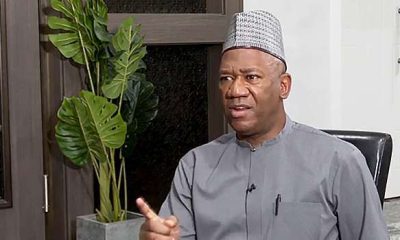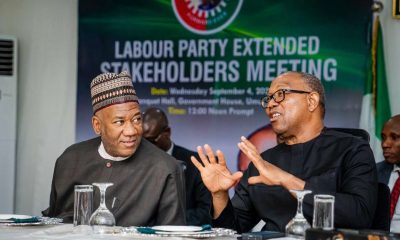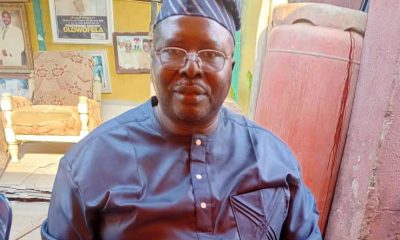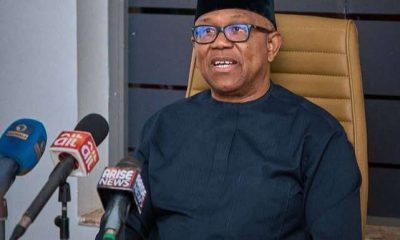Headlines
Supreme Court in corruption scandal

The judgment of Nigeria’s Supreme Court, which on Thursday, upheld the victory of Bola Tinubu in the February 25 presidential election, as declared by the Independent National Electoral Commission (INEC), has brought to an end the 2023 electoral contest.
However, while the apex court’s decision means that Tinubu’s opponents, Atiku Abubakar of the Peoples Democratic Party (PDP) and Peter Obi of the Labour Party can only now wait till 2027 to try again, the entire process culminating to the judgment has left not just the judiciary, but also the electoral umpire reeling from image crisis.
Following the judgment, the PDP in a statement on Thursday by Hon. Debo Ologunagba, its National Publicity Secretary said the party “and indeed majority of Nigerians are alarmed, disappointed and gravely concerned with the reasoning of the Supreme Court, which the PDP believes is against the express provisions of the Constitution of the Federal Republic of Nigeria, 1999 (as amended), the Electoral Act, 2022, the Guideline and Regulation issued by INEC under which the election was conducted.”
He further noted that, “The PDP asserts that it is indeed a sad commentary for our democracy that the Supreme Court failed to uphold the provisions of the law. Instead, it trashed the expectation of majority of Nigerians, who looked up to it as a Temple of Impartiality to deliver substantial justice in the matter having regards to the laws and facts of the case.”
The Labour Party on its part, through a statement by its national Chairman, Julius Abure, said the party watched as “the sacred fabric of justice and good conscience was shredded today at the Supreme Court as it delivered its verdict in the case between our party, the Presidential candidate and the APC Presidential candidate.
“We are indeed very shocked and surprised that even the apex Court will toe the line of an earlier judgement in spite of all the flaws associated with the judgement delivered by the Presidential Election Appeal Tribunal.”
However, the President’s supporters, from Rev. Father Hyacinth Alia, governor of Benue State, to his Ogun state counterpart, Dapo Abiodun, including former Niger Delta militant leader, Government Ekpemupolo, alias Tom Polo, who placed front page advert on all major national dailies on Friday, and indeed the President himself, have celebrated the judgment as victory for democracy.
Tinubu in a statement after the judgment, argued that, “The court has done justice to all issues put up for consideration in the petitions on the merits of the law, without fear or favour.
“There is no doubt, with the profound judgment of today, that our electoral jurisprudence and constitutional democracy are further consolidated and embedded more indelibly in our national identity because of the diligence and undaunted professionalism of the Honourable Justices, who presided over the matter.”
But their voices have been drowned by many, including judicial officers, who have continued to express dismay over the turn of events in the country.
“Nigerians are not stupid. They may not be lawyers, but they know the facts and the truth,” said Jibrin Okutepa, a Senior Advocate of Nigeria (SAN), who backed Peter Obi during the election.
“Let us use our judicial process to hold institutions accountable. But where the judiciary is seen not to hold institutions accountable as it ought to do, we cannot make people praise them. Judgments and judicial decisions ought to solve current and future problems and not encourage them.”
According to Okutepa in a statement on Friday,”When judgments are delivered in electoral cases, drums are rolled out in celebrations by those, who know what the true positions are. In most cases, some of these judgments hardly contain remedies that meet the justice required in the judgments being celebrated by those, who are beneficiaries. Those celebrations are done to taunt others. They even see honest observations as sabotage.
“For instance, many reasonable Nigerians are finding it difficult to understand the relegation of IRev to the background in our electoral jurisprudence by the Nigerian Judiciary. This is not a matter of emotion. We need to have a rational conversation here. INEC introduced IRev to checkmate manipulations of election results. We all know what politicians do in manipulations of electoral results. We hear their confessions on national TV and in parliament.
“IRev was introduced to curb these manipulations. It was a good innovation. But now, we turned round to say these innovations matter not and that results can be manually collated without recourse to those on IRev. Why was IRev introduced? It was introduced, again as I said to curb electoral manipulations of results.”
This, among other grounds, was one upon which the appellants sought the nullification of Tinubu’s victory, but the seven-member panel of the Supreme Court, led by John Inyang Okoro, while conceding that the failure to upload results in real time as promised may have affected the credibility of the polls, toed the line of the presidential election petition tribunal, which had earlier held that no law compels the umpire to transmit election results electronically.
Justice Okoro, who read the lead judgment, contended that the failure to upload the results did not affect its outcome.
“When IReV fails, it does not stop the collation of the results,” he said. “It deprives people of viewing results. The nonfunction will affect the trust of the electorates in the election.
“Unavailability of IReV cannot be a ground for the election to be nullified. The failure did not affect the outcome of the election. The issue is resolved against the appellants. “
The apex court also resolved the question of the failure of the President to score 25% percent of votes in Abuja, the constitution having provided that a candidate must win 25% of votes in two-third of states ‘and the Federal Capital Territory,’ in favour of the defendants, maintaining that Abuja is just like any other state.
But it was the President’s Chicago State University (CSU) certificate that attracted most attention ahead of the judgment. Tinubu had, on June 17, 2022, submitted a certificate that he claimed was issued to him by CSU in 1979. However, following a marathon legal process instituted by Abubakar in the United States, the school admitted under oath that the document Tinubu presented to the umpire did not emanate from its offices and there has no record of him applying to get a new certificate.
Section 137 (1)(j) of the 1999 Constitution (amended in 2010) states that no one would be legitimately elected president of Nigeria if the person “has presented a forged certificate to the Independent National Electoral Commission, ” and with this in mind, many looked forward to seeing what the decision of the apex court would be.
However, the justices side-stepped the forgery case by claiming the evidence came too late.
Justice Okoro in his ruling said that although the deposition Atiku seeks to introduce is “one of substance”, it runs foul of the Electoral Act, which says that “after the expiration of the time for presenting election petition, no amendment shall be made. Election petitions are sui generis and have their own peculiarities.”
He continued, “The court below lost its jurisdiction to determine any matter concerning the petition after the 180 days, which expired on September 17. This court cannot do what the lower court is no longer constitutionally allowed to do by section 285 of the constitution.
“There is nothing in Section 285 (6) to suggest that the court of appeal can hear election petition matter without time limitation.”
Justice Okoro also said even if the appellants had applied for an extension of time to amend their application, their request would have been turned down, as according to him, the time allotted to election petitions “is fixed like the Rock of Gibraltar that cannot be extended or expanded”.
The judge said the appellants “were tardy and not diligent enough in their attempts to obtain the evidence they want this court to admit, ” ultimately deciding that Atiku Abubakar’s application is “hereby refused and accordingly dismissed.”
But the apex court had several precedents in which it allowed additional evidence to be tendered in a case, especially if such evidence could potentially tip the outcome of a case upon admission, and the judgment has only strengthened the conviction of many, that the judiciary had been captured.
“The point is that we have a situation, where the judiciary can find reasons to justify whatever decision it wants to take,” said Ladan Salihu, a chieftain of the PDP and former Director General of Federal Radio Corporation of Nigeria (FRCN).
“I liken it to a man holding a life pigeon and dead one in his two hands. If you chose the dead pigeon, he will say it is your luck, but if you chose the live one, he will squeeze it to death and say you have chosen the dead one.”
The 2022 electoral act, which was passed by the national assembly and eventually accented to by former president Muhammadu Buhari, had given many hope going into the election. The act, which for the first time, recognised the use of technology in the electoral process, coupled with repeated assurances by INEC that its deployment of Bimodal Voter Accreditation System (BVAS) and real time uploading of results from polling units, will eliminate vote rigging, gave many hope.
BVAS was meant to eliminate multiple thump printing of ballot papers which had characterised previous elections, while IReV was meant to sidestep the tedious manual results collation, during which winners and losers are ultimately decided in many instances.
And with these assurances, the youth population, many of whom had become disillusionment by the status quo, mobilized to ‘take back their country.’
Many rallied behind Obi, the Labour Party candidate seen as a departure from the old order. But in the event, INEC reneged on its most critical promise of uploading results from the polling units, which many argue gave room for the manipulation of the election.
However, amid the anger that trailed the outcome of the election in the opposition camp, the losing candidates, notably Obi and Abubakar, encouraged their supporters to have faith in the legal system, as they proceeded to the court to challenge the declaration of Tinubu as the winner.
Regardless, the Supreme Court decision on Thursday, has dashed such hopes, which has led to many questioning the integrity of both the legal system and the electoral umpire, amid calls for reforms and for the resignation of INEC Chairman, Prof. Mahmood.
“If we don’t rejig the electoral system in this country, we will just be running round in circles,” said Salihu, who appeared on Arise Prime Time on Friday. “INEC should not operate like a hawk. It cannot be allowed to make and change the rules in the middle of the process.”
The former FRCN boss noted that INEC chairman, Mahmood ought to have resigned after failing to live up to his promise, arguing that he brought shame upon the country.
But it was the scathing words from retiring Justice Mohammed Dattijo, that produced the greater shock to most Nigerians. Justice Dattijo, who retired from the Supreme court on Friday slammed judiciary, especially the Supreme court for corruption and tribalism in it’s composition and decisions.
Amid the arguments over the judgment, retiring justice of the Supreme Court, Justice Muhammad Dattijo,, slammed his colleagues, noting that they have allowed bribery and corruption to destroy the public confidence in the judiciary.
Mr. Dattijo, who retired on October 27 after 47 years of legal practice, as he clocks 70, decried the tragic turn of events at the apex court, noting that the current judiciary he is exiting from is far from the one he voluntarily joined and desired to serve and be identified with.
According to him, the judiciary has become a body chocked by bribery and perversion of justice, because many of those on the court have no clear understanding of what it meant to deliver justice to the Nigerian people.
“Public perceptions of the judiciary have over the years become witheringly scornful and monstrously critical,” Justice Dattijo said at a farewell ceremony held in his honour in Abuja on Friday.
“It has been in the public space that court officials and judges are easily bribed by litigants to obviate delays and or obtain favourable judgements.”
He used the opportunity of the valedictory session that was organised in his honour by the Supreme Court, to address what he observed as rots in the judiciary that have continued to affect the justice delivery system in the country.
“Through the years, I rose to become the second most senior justice of the country’s apex court and Deputy Chairperson of the National Judicial Council. Considering the number of years I have spent in judicial service and the position I have attained by the grace of the Almighty, I feel obligated to continue the struggle for reforms for a better Judiciary and would be leaning on the earlier submissions of those, who had exited before me,” Justice Dattijo stated before he descended on the CJN.
According to him, the judiciary, as presently structured, gave so much powers to the CJN, who he said usually takes decisions without consulting other justices.
“As presently structured, the CJN is Chairman of the NJC, which oversees both the appointment and discipline of judges, he is equally Chair of the Federal Judicial Service Commission (FJSC), the National Judicial Institute (NJI), the Legal Practitioners Privileges Committee (LPPC) that appoints Senior Advocate of Nigeria,” he said.
“In my considered opinion, the oversight functions of these bodies should not rest on an individual alone. A person with absolute powers, it is said, corrupts easily and absolutely. As Chair of NJC, FJSC, NJI and LPPC, appointments as council, board and commitment members are at his pleasure.
“He neither confers with fellow justices nor seeks their counsel or input on any matter related to these bodies. He has both the final and the only say. The CJN has power to appoint 80 percent of members of the council and 60 percent of members of FJSC. The same applies to NJI and LPPC.
“Such enormous powers are effortlessly abused. This needs to change. Continued denial of the existence of this threatening anomaly weakens effective judicial oversight in the country. ”
On the current composition of the bench of the apex court, Justice Muhammad alleged that the refusal to fill the vacant slot of South East on the apex court bench, was deliberate, blaming it on “absolute powers vested in the office of the CJN.”
He further stressed that with his retirement, the North Central zone, which he represented, would no longer have a Justice on the Supreme Court bench.
“My lord Hon. Justice Ejembi Eko JSC, who also represented the zone retired on 23rd of May, 2022. It has been a year and five months now. There has not been any replacement. With the passing of my lord, Hon. Justice Chima Centus Nweze, JSC on 29th July 2023, the South East no longer has any presence at the Supreme Court.
“My lord, Hon. Justice Sylvester Nwali Ngwuta JSC died on 7th March 2021. There has not been any appointment in his stead for the South East. As it stands, only four geo-political regions- the South-West, South-South, North-West and North-East are represented in the Supreme Court.
“While the South-South and North-East have two serving justices, the North-West and South-West are fully represented with three each.
“Appropriate steps could have been taken since to fill outstanding vacancies in the apex court. Why have these steps not being timeously taken? It is evident that the decision not to fill the vacancies in the court is deliberate. It is all about the absolute powers vested in the office of the CJN and the responsible exercise of same,” the retiring jurist added.
On the issue of membership of the panel that heard the presidential election appeals by Abubakar and Obi, Justice Muhammad, said: “To ensure justice and transparency in presidential appeals from the lower court, all geo-political zones are required to participate in the hearing.
“It is, therefore, dangerous for democracy and equity for two entire regions to be left out in the decisions that will affect the generality of Nigerians. “This is not what our laws envisage. Although it can be posited that no one expected the sudden passing of Hon. Justice Nweze JSC, yet, it has been two years and seven months since the previous justice from South-East died and no appointment was made.”
Speaking on funding and independence of the Judiciary, the retiring justice bemoaned that though the budgetary allocation for the Judiciary increased from N70 billion that it was in 2015 to N165billion presently, “Justices and officers welfare and the quality of service the judiciary renders have continued to decline.
“It may interest one to know that the Chief Registrar of the Supreme Court earns more than the Justices. While she earns N1.2m per month, justices take home N751,000 in a month. “The CJN on his part takes home N400, 000 plus. The salary of a Justice, curiously, drops rather than increases when he gets the added responsibility of being a CJN. “The unjust and embarrassing salary difference between the justices and the Chief Registrar remains intriguing, to say the least.”
He noted that it was owing to allegations of corruption and perversion of justice, that informed President Muhammadu Buhari’s decision to order the invasion of homes and arrest of some judges in 2016.
“Not done, in 2019 the government accosted, arrested and arraigned the incumbent Chief Justice before the Code of Conduct Tribunal for alleged underhand conduct. “With his retirement negotiated, he was eventually left off the hook.
“In 2022, a letter signed by all other justices of the Supreme Court, including the current Chief Justice, the aggrieved protested against the shabby treatment meted to them by the head of the court and the Chief Registrar.
“In the event, his lordship Ibrahim Tanko Muhammad disengaged ostensibly on grounds of ill-health.
“My lords, distinguished invitees, ladies and gentlemen, it is obvious that the judiciary I am exiting from is far from the one I voluntarily joined and desired to serve and be identified with. The institution has become something else,” Justice Muhammad lamented.
Mr. Dattijo indicated he was not the only justice with an unflattering review of the judiciary while on the way out, citing a similar observation made by a former justice of the Court of Appeal, Oludotun Adefope-Okojie, who retired in May 2023 at 70.
Mr. Dattijo said Mrs. Adefope-Okojie, while retiring, lamented that justices at the top levels of the Nigerian judiciary have failed to amend their corrupt way even as the public anger intensified.
“Pleas are expressed every day by the generality of the public begging the judiciary to be just, to be truthful, and to save the country from collapse,” the justice said.
While further citing Mrs Adefope-Okojie more extensively, Mr. Dattijo recalled other parts of his retired colleague’s observation of the court’s descent from grace.
“My question is whether the judiciary needs to be begged or cajoled? What is it that qualifies any person to bear that exalted name ‘Honourable Justice’? Is it not for him to administer justice without fear or favour?
“Unfortunately, it has been severely vilified with the Apex Court so denigrated and called by a social commentator,8 as a voter gaggle of useless, purchasable judicial bandits.
“How did the judiciary get to this level? Why is the whole country on edge for fear of what the public regards as unpredictable judicial pronouncements? There must be a rethink and a hard reset.
“If the people we have sworn to defend have lost confidence, there is a problem that must be addressed,” Mr. Dattijo noted in his emphasis on Mrs. Adefope-Okojie’s remarks.












